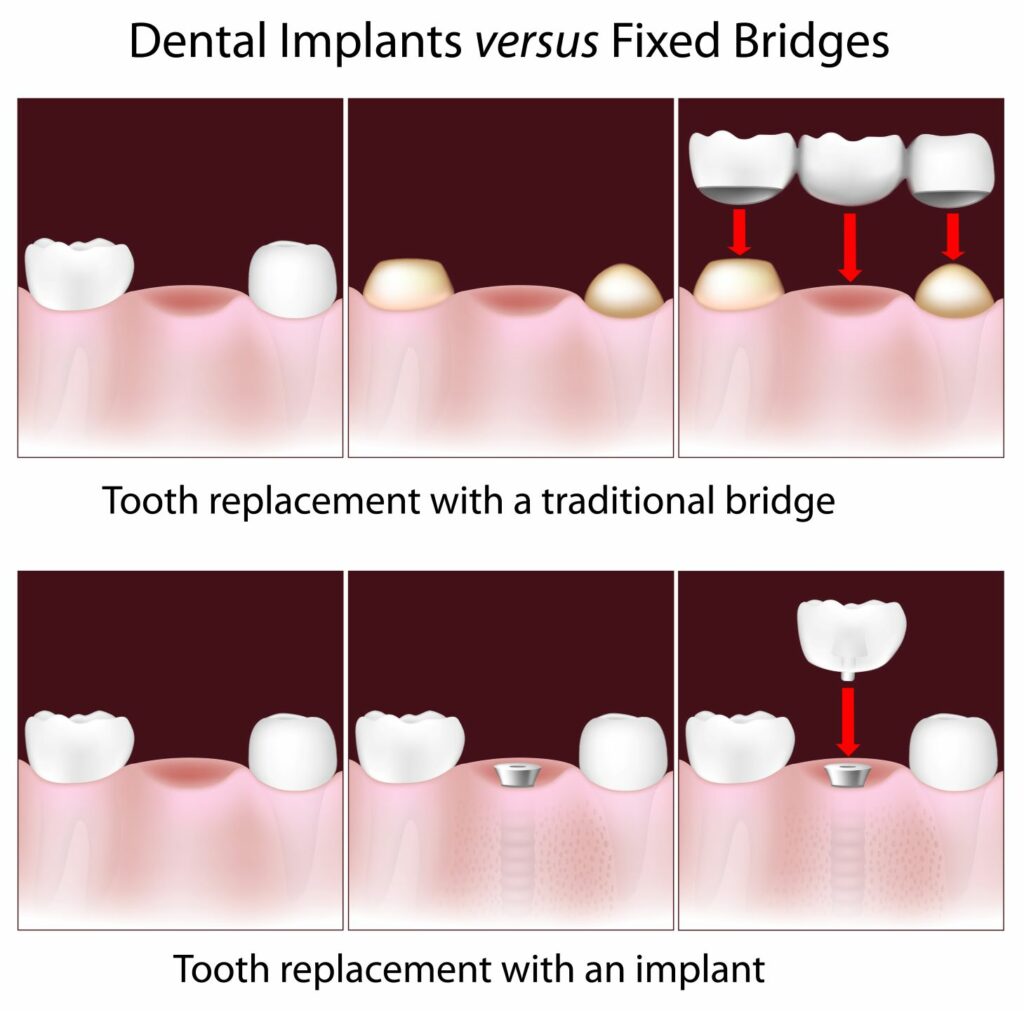Dental Bridge vs. Implant: Which Is Right for You?
Share
When looking for the best tooth replacement options, two popular solutions often come up: dental bridges and implants. These methods are designed to restore missing teeth, enhance oral function, and improve the aesthetics of your smile.
However, choosing the right one for your situation depends on several factors. As such, understanding the differences between dental bridges and implants can help you make an informed decision with your dental care provider.
Read on to learn the pros and cons of both dental bridges and implants, providing a clear comparison to guide your choice.
Choosing Between an Implant or Dental Bridge
When deciding between an implant or dental bridge for tooth replacement, it’s important to weigh the advantages and disadvantages of both options. Here’s what you need to know about dental implants and bridges:
Understanding Dental Bridges
A dental bridge refers to a prosthetic device designed to fill the gap left by missing teeth. It involves two or more crowns for the teeth located on either side of the gap (called abutment teeth) and a false tooth (or teeth) in between. These false teeth can be made from many materials, including alloys, gold, porcelain, or a combination of these materials.
Furthermore, dental bridges are known for the following advantages:
- Quicker Procedure: A dental bridge can typically be completed in just a few visits to your dentist. It doesn’t involve a surgery, making it a less invasive option compared to implants.
- Cost-Effective: Dental bridges are often more affordable than implants, especially when multiple teeth need to be replaced. Since they don’t involve surgery, the overall cost of treatment is generally lower.
- Restores Function and Appearance: A well-made bridge can restore the ability to chew and speak properly. It also provides a natural look that blends well with the existing teeth.
- Minimal Downtime: Recovery time after receiving a dental bridge is relatively short. Patients can typically resume normal activities soon after the procedure.
On the other hand, below are the disadvantages of dental bridges:
- Involvement of Adjacent Teeth: A significant disadvantage of dental bridges is that they require the adjacent healthy teeth to be reshaped and reduced to support the crowns. This may compromise the strength of these supporting teeth over time.
- Lifespan: While dental bridges are durable, they don’t last as long as dental implants. A bridge may need to be replaced every 10 to 15 years, primarily if proper oral hygiene isn’t maintained.
- Risk of Decay: Since a bridge rests on the existing teeth, decay could develop around the crowned teeth, potentially leading to further dental issues.
Knowing these pros and cons, you’ll know whether investing in dental bridges is an effective solution for your dental needs.
Understanding Dental Implants
Dental implants refer to artificial tooth roots, usually made of titanium, that are attached into the jawbone through a surgical procedure. Once the implant fuses with the bone (in a process called osseointegration), a crown is placed on top to replace the missing tooth. Implants are also designed to mimic the function and appearance of natural teeth and can be used to replace single or multiple teeth.
Additionally, below are the benefits of dental implants:
- Longevity: One of the primary benefits of dental implants is their long lifespan. With proper care, they can last a lifetime, making them a highly durable option for tooth replacement.
- Bone Preservation: Implants stimulate the jawbone, which helps prevent bone loss in the missing tooth area. This is crucial for maintaining the structural integrity of the jaw and the shape of your face.
- Natural Look and Feel: Implants look, feel, and function like real teeth. They can provide a seamless and comfortable solution that allows you to eat, speak, and smile confidently.
- Independent of Other Teeth: Unlike dental bridges, implants don’t rely on adjacent teeth for support. This means the surrounding teeth aren’t altered or compromised during the procedure.
But despite the advantages, the following are the downsides of implants:
- Surgical Procedure: Dental implants require surgery to place the titanium post into the jawbone. This can be a more invasive procedure than getting a dental bridge, and it may require a longer recovery time.
- Cost: Implants tend to be more expensive upfront than dental bridges. However, their durability and long-term benefits can make them a more cost-effective solution in the long run.
With these advantages and disadvantages, you can decide which is the perfect fit.
Factors to Consider in Your Decision
Choosing between a dental bridge and an implant involves several key factors. These include:
Oral Health
The condition of your remaining teeth and gums plays a key role in determining whether a dental bridge or implant is right for you. Healthy teeth are needed to support a bridge, while implants require a strong, healthy jawbone to ensure a successful journey of smile restoration.
Number of Missing Teeth
A bridge may be a more practical solution if multiple teeth in a row are missing. Implants, while more durable, require individual placement for each tooth, which can be more costly and time-consuming for larger gaps.
Budget
Cost is always a significant factor in choosing between treatments. Dental bridges tend to have a lower upfront cost, whereas implants are more expensive initially but may provide better long-term value.
Longevity and Maintenance
Implants are the better choice if you’re looking for a solution that requires less maintenance and has a longer lifespan. However, a dental bridge could be the right option if you prefer a quicker solution that fits within a tighter budget.
Final Thoughts
Ultimately, deciding between a dental bridge and an implant comes down to your personal needs, oral health, and lifestyle. While dental bridges offer a faster and less invasive option, dental implants provide a more permanent and natural-feeling solution. By keeping the information mentioned above in mind, you can ensure you make the best choice for your long-term oral health and comfort.





